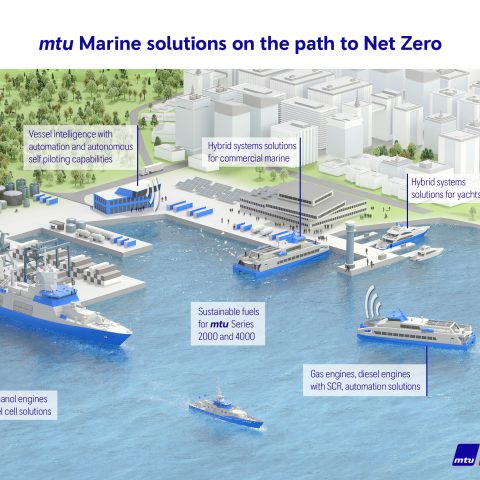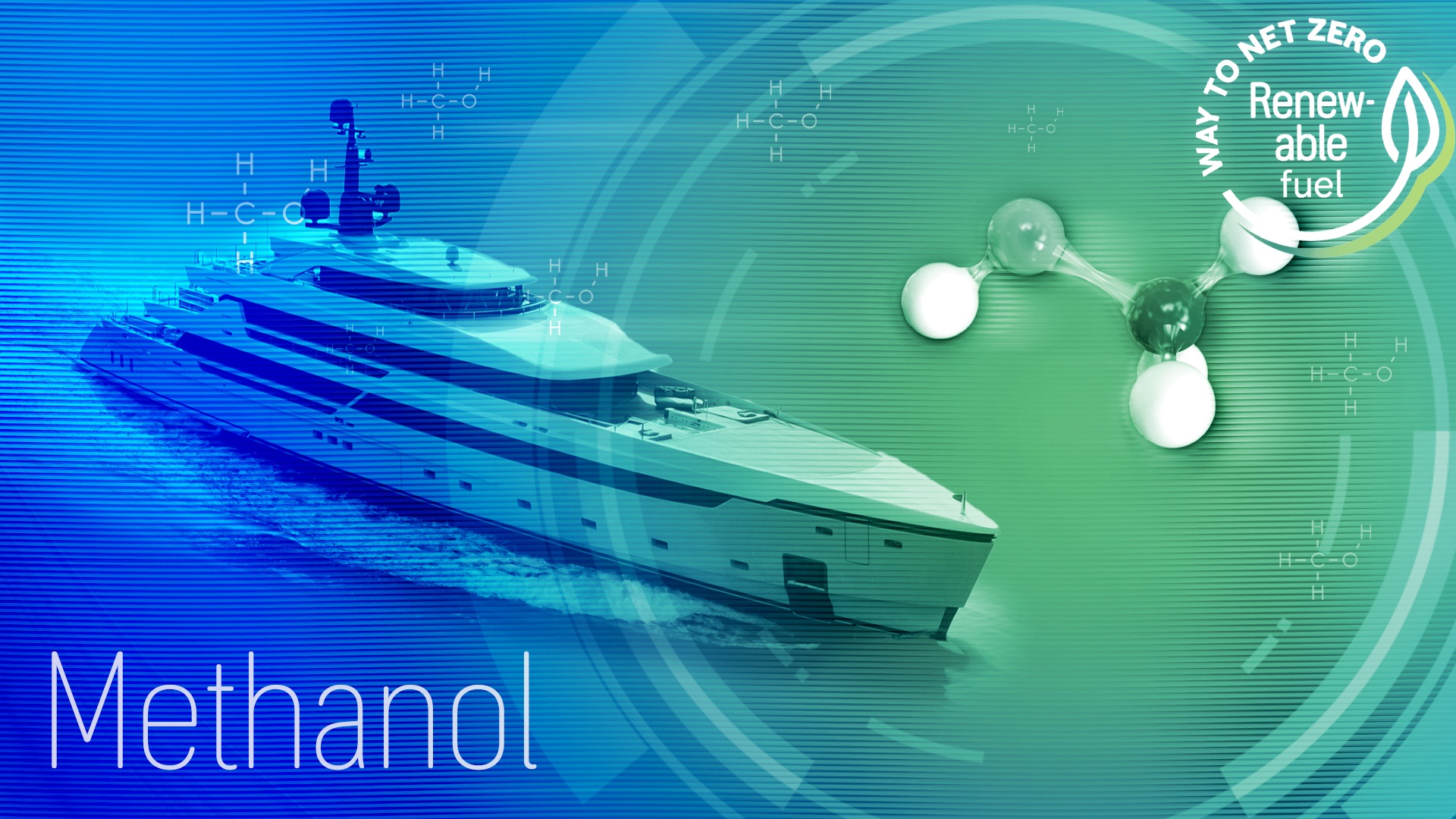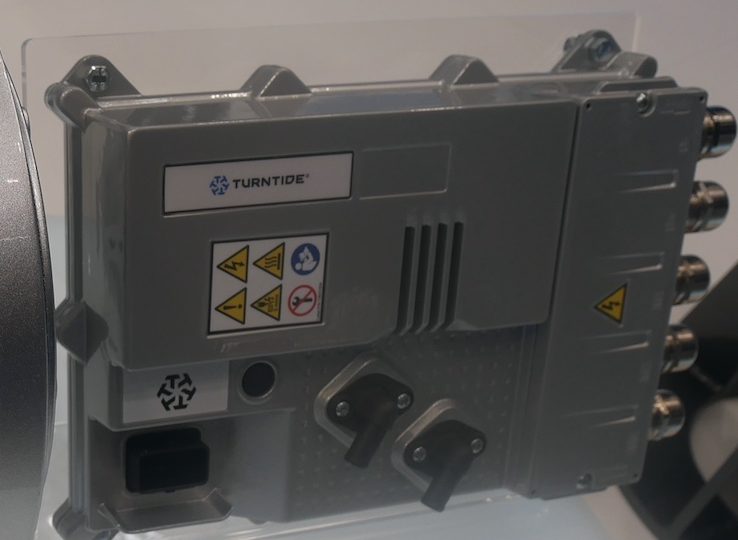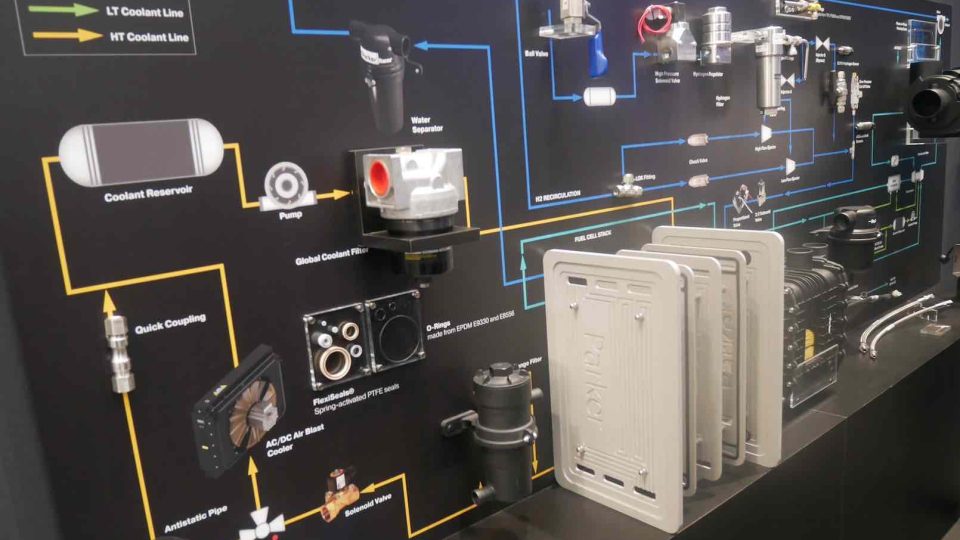Rolls-Royce at SMM: methanol engine, fuel cells, hybrid systems
At SMM, the international maritime industry trade fair, in Hamburg, Rolls-Royce showcased new sustainable mtu marine solutions for propulsion, automation and service under the slogan “Pioneering the journey to Net Zero”.

At SMM, the international maritime industry trade fair, in Hamburg, Rolls-Royce showcased new sustainable mtu marine solutions for propulsion, automation and service under the slogan “Pioneering the journey to Net Zero”. At booth 307 in Hall 3A, Rolls-Royce presented methanol engines, fuel cell concepts, hybrid systems, diesel engines with exhaust aftertreatment and for use with sustainable fuels, as well as mtu NautIQ marine automation products. We will deepen these news in the next issue of Powertrain (November).
Methanol engines based on the mtu Series 4000
E-methanol is a CO2-neutral fuel due to its production via renewable energies. It has the potential to shape the energy transition in marine propulsion systems, for example for tugs, yachts, fast ferries and coastal shipping. “We are clearly committed to methanol as a marine fuel for the future and want to be a pioneer here,” said Denise Kurtulus, Vice President Global Marine at Rolls-Royce. Rolls-Royce Power Systems is initially developing methanol engines based on the mtu Series 4000 and will launch them on the market from 2026. The energy density of this fuel is high compared to other sustainable fuels, and its liquid state makes it easy to store and refuel at ambient temperatures. In addition to reduced complexity, the more attractive investment costs are another advantage of the methanol tank system.
During the press conference at SMM, Daniel Chatterjee, Director Technology Management & Regulatory Affairs, explained in detail how Rolls-Royce Power Systems plans to decarbonise applications and what are the advantages of methanol over hydrogen.
mtu fuel cell systems
Rolls-Royce Power Systems is already working on the development of fuel cell systems for marine applications and will launch its own mtu fuel cell systems for main propulsion and on-board power generation from 2028. It is Benjamin Oszfolk, systems engineer at Fuel Cell Energy Storage Systems Marine RRPS, to illustrate this aspect: fuel cells powered by hydrogen do not produce any harmful emissions, neither CO2 nor nitrogen oxides or particulates. Fuel cells powered by green methanol emit only small amounts of CO2 due to the required methanol reformer, but no more than was previously bound in the e-methanol and are thus operated in a CO2-neutral manner. Their low noise emissions and vibrations and their very high efficiency (approx. 50-60%) are further advantages that make fuel cell systems interesting for shipping. Due to its physical properties, the introduction of hydrogen as a fuel for ships still poses some challenges, for example with regard to infrastructure and on-board bunkering.
Hybrid PropulsionPack for mtu Series 2000 and 4000
The mtu Hybrid portfolio – illustrated by Tobias Kohl, Director Application Engineering Marine at RRPS –offers flexible propulsion solutions for yachts, ferries, tugs and windfarm vessels. The system intelligently combines diesel engines with electric propulsion modules, batteries, gearboxes, control and monitoring systems and other electronic components to provide speed, comfort, efficiency and local emission-free cruising as required. The mtu Hybrid PropulsionPack is offered in a power range from 1,119 kW to 4,300 kW by the diesel engines plus 165 kW to 743 kW by the electric motors per powertrain. The maximum propulsion power is 10,000 kW per vessel. To ensure the optimum propulsion solution for each type of ship, Rolls-Royce offers a modular kit with standardized components.
Rolls-Royce had announced in 2021, through its “Net Zero at Power Systems” sustainability program, that it would realign the Power Systems business unit ’s product portfolio so that by 2030, sustainable fuels and new mtu technologies would reduce greenhouse gas emissions by 35 percent compared to 2019 levels. “Since the last SMM in 2018, we have completely realigned our marine portfolio to actively support our customers on their journey to carbon neutrality,” said Denise Kurtulus.
In the meantime in Cannes… Rolls-Royce and Sanlorenzo together for methanol propulsion in luxury yachts
Rolls-Royce and Italian yacht builder Sanlorenzo plan to develop and build a large motor yacht with a methanol engine propulsion system able to run carbon-neutrally on green methanol. The two companies announced an exclusive memorandum of understanding to this effect for yachts between 40 and 70 meters on the eve of the opening of the 2022 Cannes Yachting Festival. Powered by two mtu methanol engines based on the Series 4000, the Sanlorenzo yacht is expected to undertake her maiden voyage in 2026.
“Synthetic methanol, produced using electricity generated from renewable sources,” explained said Denise Kurtulus, “is the obvious fuel of the future for many maritime applications – not least yacht propulsion.” This is because methanol is a liquid which is easy to manage, and people are already used to handling it because it is already available in ports today.
Green methanol is climate-friendly and carbon-neutral because it is produced using solar or wind power: the first stage is to take hydrogen and synthesize it into methanol (CH3HO) using carbon and oxygen from the air. Carbon in the form of CO2 is released into the air during combustion – but no more than was taken from it during production of the fuel. As a result, the cycle is carbon-neutral. Emissions of particulate and nitrogen oxides are also much lower than from diesel engines, making it possible to stay within NOx limits without an SCR unit treating the exhaust gases.










